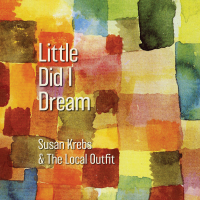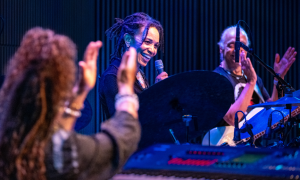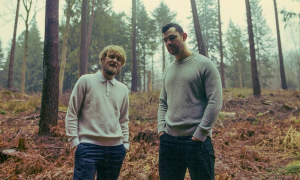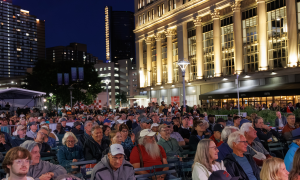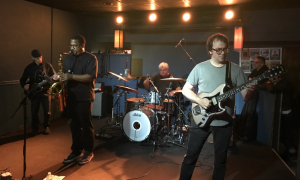Home » Jazz Articles » Live Review » Galway Jazz Festival 2018: Day 3
Galway Jazz Festival 2018: Day 3

The keys of Roth's sax clacked like claws on stone beneath the mercurial, bubbling sounds of the feedback.
Various Bands
Various Venues
Galway Jazz Festival
Galway, Ireland
October 6, 2018
On Saturday morning in The Mick Lally Theatre's lobby, Galway Jazz Festival's Pop Up Record Shop sold the works and wares of the festival's many performers. Meanwhile, over the customers' heads in a loft rehearsal space, Toner Quinn from the Journal Of Music led the "Brexit Schmexit" panel. The Irish artistic community's unspoken fears of Brexit were at last said aloud, robbing those fears of some power.
At high noon in the Nuns' Island Theatre,
Back in the Black Gate Cultural Centre's candle-lit basement beneath Eglinton Street,

Nick Roth
saxophone, altob.1982
It began just as Roth described it to the crowd: with feedback tones from his alto saxophone, as deep and open as the Mariana Trench. The keys of Roth's sax clacked like claws on stone beneath the mercurial, bubbling sounds of the feedback. Roth seemed to be sculpting the airwaves; they dripped with the wet sonic clay he molded beneath his fingers. He rocked back and forth as the tones pulsed and throbbed, sending air whooshing through his horn in great lungfuls. A scraping, abrasive sound above the quiet rhythm of the feedback was joined by the atmospheric recording of tropical rainfall on a jungle's massive leaves. Roth then put down his alto and turned to the piano. For a split second, there was only the light sound of the raindrops, until the piano's notes started to echo spectrally through the basement, chased by a low, tolling note from the left-hand side of the keyboard.
Roth let gentle jazz chords fly that offset the natural ambience of the loops and the upright piano's notes. The dissonance grew as he moved to higher cluster chords and the groove rolled in on fractured limbs.

Cecil Taylor
piano1929 - 2018

Pharoah Sanders
saxophone, tenor1940 - 2022
The loop of soft pattering rainfall on undergrowth played the whole time. Roth moved back to the soprano and the songs of birds of paradise offset its violent leaps and honks as well as his rocking back and forth. He paused to tap a key on the laptop, cueing a loop of his last few licks. He bounced a chord off the piano's keys as the music of the tropics dropped away. Walking a bass line across the left-hand keys, a huge big band chord ushered in a duel between both hands. Once more, a fresh loop began, this time of the piano, and Roth picked up his alto once more and reacted to the loops' movement with spontaneous energy. Finally, he picked up his soprano one last time to end the work on a long low note.
Roth congratulated the crowd on sitting through a piece that many would describe as "difficult" yet would be more aptly described as "brilliant." It is too rare nowadays for an artist to make music that is both as complex and brilliant as that of Roth at Galway. When bass clarinetist and assistant festival programmer
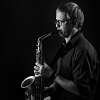
Matthew Berrill
saxophone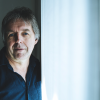
Huw Warren
pianoMany of the same faces were present once again in the Mick Lally Theatre that afternoon.

Tommy Halferty
guitar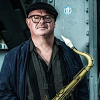
Michael Buckley
saxophone
Aleka Potinga
vocalsb.1988
Many listeners left the auditorium only to come back very shortly for the exquisite, passionate set from German saxophonist
Anna-Lena Schnabel
saxophoneThe tension and volume crept ever higher as the piano played huge, clashing block chords and Schnabel threw percussion instruments into the piano. The pianist played like some possessed mad scientist, passionately ripping horror movie chords from the piano while the death rattles of the abandoned percussion instruments sounded from within its body. Schnabel then picked up her saxophone, and the piano suddenly quieted down, as if someone dropped a guillotine blade on the volume. An immense, lumbering groove kicked in, almost heavy metal in its weightiness, and Schnabel threw down a simple sax line in a strong, muscular tone. She played with rapturous, dark euphoria, like Pharoah Sanders descending into Hell, moving through the tempo changes and the mad pace to another sharp, sudden drop in volume. The piano played gently, softly before a final harmonic from the bass. After the applause, Schnabel's fiery passion visibly moved back into her.
She shyly introduced "Toy," a tune in 3/4 time but void of any strong backbeat. It relied more on the infamous concept of "implied time," where each member keeps time for themselves and rhythm be damned. The band soared over the song's wide sheets of sound as Schnabel threw her head back and raised her sax in a passion at marked odds with the opening, bowed bass note of the following tune, "Lost Lament." For that tune, the bass created a mournful, dark sound that almost conveyed the physical feeling of the bow's horsehair on the strings. Schnabel entered with a wide, soft tone on her sax that hardened as the tune approached its terminus. Suspenseful broken piano chords trickled out of the keys, which hung softly over the sharp smacks of the chainless snare drum opening the next tune. The pianist took up the melodica to close that tune with

Ornette Coleman
saxophone, alto1930 - 2015
With books placed in the piano's strings, "Drunken Books" slid in on glassy, frightening prepared piano sounds that were as sharp and glittering as a broken kaleidoscope. Schnabel muted her saxophone with the side of her knee. The pianist played a Jerry Lee Lewis style trill that slowly metamorphosed into a dissonant European lick at odds with its American juke joint origins. As the title implied, the band lurched drunkenly through triple meter while the piano strings clicked against the paperbacks until stuttering saxophone finish.
"Plop," the quartet's finale, was built on a riff that contrasted with the softness of the song's title. The sax honked and spat notes that rose and fell sharply. The dissonant but disciplined riff that sprang up grew from the pure, nourishing wells of Ornette Coleman and

John Coltrane
saxophone1926 - 1967
For their encore, "Goodnight," Schnabel at last picked up the flute that had gone untouched beside her microphone all evening. Once again, the band led the crowd across 3/4 time but now in a gentle, pastoral rhythm. Schnabel would shoot up onto her toes' tips when she hit a high note. The pianist's hands crossed over each other, the right hand playing a complex bass line while the left played a simpler melody atop it. The emptiness and expansiveness, of the piece gave a sense of immensity and possibility, as beautiful as watching a the swirl of a nebula. Then, it was done, ending on the haunting higher keys of the piano. After the all the wildness, the show came to a peaceful rest.
A short while later, the

Ashley Henry
pianob.1991
Cherise Adams-Burnett
vocalsOnce again, the festival raged on into the wee hours at Biteclub, described as resembling "Downtown Abbey run by anarchists."

WorldService Project
band / ensemble / orchestraTags
Live Reviews
Anna-Lena Schnabel
James Fleming
Ireland
In Flow
Nigel Mooney
The Jonny Taylor Trio
Nick Roth
Matthew Berrill
Huw Warren
Tommy Halferty'
Michael Buckley
Aleka Potinga
Anna Lena Schnabel
Ashley Henry
Cherise Adams-Barnett
World Service Project
Comments
PREVIOUS / NEXT
Support All About Jazz
 All About Jazz has been a pillar of jazz since 1995, championing it as an art form and, more importantly, supporting the musicians who make it. Our enduring commitment has made "AAJ" one of the most culturally important websites of its kind, read by hundreds of thousands of fans, musicians and industry figures every month.
All About Jazz has been a pillar of jazz since 1995, championing it as an art form and, more importantly, supporting the musicians who make it. Our enduring commitment has made "AAJ" one of the most culturally important websites of its kind, read by hundreds of thousands of fans, musicians and industry figures every month.


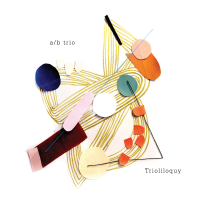


 Buy Now
Buy Now



